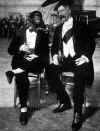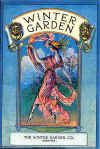Jolson 101
Al Jolson Biography: Part II
by John Kenrick
(Copyright 2003)
(All the photos on this page are thumbnail images – click on them to see larger versions.)
Early Hits
 Playing
the blackface character Gus, Al Jolson chats with
Lawrence D'Orsay in The Whirl of
Society (1912).
Playing
the blackface character Gus, Al Jolson chats with
Lawrence D'Orsay in The Whirl of
Society (1912).
Henrietta wanted Jolson to take a well deserved break and start a family, but he was not about to walk away from cheering audiences. After taking La Belle Paree on a triumphant tour through New England, Jolson returned to the Winter Garden in the Shubert Brothers's lavish new musical Vera Violetta (1911 - 112). With a threadbare plot holding together a string of specialty acts, the show was uneven, but Jolson's showstopping renditions of "Rum Tum Tiddle" and George M. Cohan's "That Haunting Melody" verified his status as a Broadway star.
The Whirl of Society (1912 - 136) was another revue-like musicalnin which Jolson first played the blackface character Gus. An African American underdog who outsmarted his enemies while exchanging wisecracks with the audience, Gus proved to be Jolson's perfect alter ego. He would play this character in musical after musical, fitting this resourceful survivor into all sorts of unlikely situations. Jolson also began interpolating whatever new songs caught his fancy – and audiences went wild. "Waitin' For the Robert E. Lee" and "Row, Row, Row" made it into The Whirl of Society, and became standards in Jolson's repertoire. Soon, publishers would do anything to interest him in their songs, because Jolson could make almost any tune sound like a hit.
Along with his eight weekly performances in Whirl, Jolson spent his night off appearing in the Winter Garden's Sunday concerts. Since New York's "blue laws" barred formal theatrical performances on Sundays, the Shuberts offered all-star "concerts" with the performers in street clothes. Jolson was invariably one of the last acts on the bill, and audiences demanded song after song from him. At Jolson's urging, the Shuberts built a runway that reached out into the Winter Garden auditorium, allowing Jolson to dance and sing right into the midst of the audience. His fifteen minute slot often ran forty minutes or more. At age 27, Jolson had energy to spare.
After a summer break and an autumn tour of Whirl, Jolson starred in The Honeymoon Express (1913 - 156). This time, the resourceful Gus was a butler whose master must postpone a divorce in order to receive an inheritance. On opening night, Jolson asked the audience, "Do you want to hear the rest of the story, or do you want me?" When they shouted their approval, he turned the show into a concert, singing song after song. No Broadway performer before or since ever attempted such a reckless stunt – Jolson made it a trademark. In his future Shubert shows, he would often dismiss the cast and give particularly appreciative audiences an hour or more of pure Jolson. An initial line-up of co-stars gradually melted away, and Jolson soon received top billing for the first time in his career.
During the Broadway run, Jolson interpolated "You Made Me Love You," falling to one knee during the final chorus. He often told interviewers he did this to relieve pressure on an ingrown toenail, but that was pure bunk. Jolson had seen another performer use the same gimmick to limited effect, and simply took it to another level.
 This
was the program cover for The Winter Garden during the years that Jolson
reigned as its premiere star.
This
was the program cover for The Winter Garden during the years that Jolson
reigned as its premiere star.
Jolson's next Winter Garden musical Dancing Around (1914 - 145) had a score by esteemed composer Sigmund Romberg, but few noticed it – least of all Jolson. He added and subtracted songs at will. The interpolated "Sister Suzie's Sewing Shirts for Soldiers" became a minor sensation, and Jolson offered a reward to anyone who could sing the tongue twisting refrain faster than himself. There is no record of anyone collecting that reward –
Sister Suzie's sewing shirts for soldiers.
Such skill at sewing shirts our shy young sister Suzie shows.
Some soldiers write epistles,
Say they'd sooner sleep in thistles
Than the saucy, soft, short
Shirts for soldiers sister Suzie sews.
Stardom
Robinson Crusoe Jr. (1916 - 139) had Jolson playing three roles – Crusoe's man Friday, Gus, and someone named Fatima. The disjointed plot was of no importance. Audiences came to see and hear Jolson, and he gave them what they wanted. His most popular interpolations included "Where the Black Eyed Susan's Grow" and "Where Did Robinson Crusoe Go With Friday on Saturday Night?" After Broadway, the show toured for over a year. The Shuberts began billing Jolson's name above the title, the official recognition that he was a bona fide star.
When the tour reached Washington D.C., Jolson invited his family to watch him sing for President Wilson. But their seats went unused. It was the Sabbath eve, and the rabbi Moshe Yoelson was busy singing for god. Moshe may have been proud of his son, but he seemed to take pleasure in being the one person who could always puncture Al's inflated ego – and remind him of his roots. Al developed an abiding respect for his father, buying Moshe and Hessi a handsome house and visiting occasionally. Moshe accepted these gestures cordially, but it seems he never expressed the approval Al craved.
The public was happy to give Jolson cascades of approval. The Shuberts started billing Jolson as "America's Greatest Entertainer" in his next musical, Sinbad (1918 - 164). Jolson certainly felt the pressure – on opening night his stomach was in so many knots that buckets were placed in both wings of the stage. This time, he interpolated some of the greatest songs of his career, but he realized there was no reason he shouldn't share in the success of the songwriters. Jolson contributed lyrics to many of the interpolations, giving himself a share in the royalties – as well as the legal right to improvise new verses as he saw fit. "N'Everything" and "I'll Say She Does" proved popular, but the biggest hit of the Broadway run was "Rock-a-Bye Your Baby With a Dixie Melody."
Sinbad toured for just under two years, and Jolson kept adding songs along the way. "Avalon" became a permanent part of his repertoire, as did "Swanee," a song by Irving Caesar and George Gershwin that had already been heard in an unsuccessful revue. When Jolson took it on, the song quickly became a favorite. He scored another career high with "My Mammy," which stopped Sinbad the night he introduced it. More identified with this than any of his many hits, Jolson was happy to describe himself as "a singer of Mammy songs." During America's participation in World War I, Jolson sang at War bond rallies and relief benefits, helping to raise millions of dollars. He also performed at military camps, a habit he maintained happily for the rest of his life. To young men facing deprivation and possible death, Jolson's sentimental songs of home and "Mammy" had irresistible appeal.
![]() Jolson is seen between Queen Isabella and Christopher
Columbus in this scene from Bombo.
Jolson is seen between Queen Isabella and Christopher
Columbus in this scene from Bombo.
Jolson's next musical premiered in a handsome new 1,600 seat house the Shuberts named Jolson's 59th Street Theatre. Bombo (1921 - 213) started with Jolson's blackface character Gus as the servant for a modern day explorer. In a flashback, he became a slave that Columbus brought along on his first voyage to the new world. Al was so petrified with nerves that he had to literally be pushed on stage, but he gave a breathtaking performance that left the audience chanting his name. He finished the evening with thirty seven curtain calls. Jolson's interpolations included "April Showers." During the three year tour, he added "Toot, Toot, Tootsie" and "California Here I Come."
Loved and Hated
Al Jolson's personality was an outsized explosion of contradictions. Despite his almost frightening self-assurance on stage, he was so nerve wracked that he usually had vomit buckets placed in the wings – and he used them, especially on opening nights. He performed at countless benefits and gave well over a million dollars to charity, but would conveniently forget to pay off loans from longtime friends. He referred to himself in two ways -- "Jolson" whenever discussing his professional work, and "Jolie" when the subject was his personal life.
Obsessed with being perceived by his peers as "a man's man," Jolson was a familiar face at boxing matches and race tracks, and had a reputation as a heavy better. He used a code with his regular bookies – a bet for "five thousand" was really fifty bucks, "Ten thousand" was a hundred, and so on.
At the height of his fame, Jolson regularly auditioned the work of new songwriters. Frequently, he would make a few adjustments to the lyrics so he could receive part of the royalties. If anyone sharing a stage with Jolson won major applause, he warned them not to let it happen again. If it did, he would have the offending performer fired. For all his talent and fame, Jolson could not face the possibility of competition. Buckets were kept just offstage for those nights when his insecurities got the better of him.
Each of Jolson's first three wives got some version of his pointlessly cruel "yo-yo" treatment. He would make a desperate phone call, begging for her to travel cross country to be with him. She would drop everything, travel for days, and be welcomed with a quick hello as he turned her around and sent her back home. Jolson pursued countless chorus girls, and was reputedly not above having call girls brought backstage to relieve his stress during intermissions. He drove his wife Henrietta to distraction with this kind of behavior – he would do it again with her successors.
In 1918, Henrietta filed for divorce. For more than a decade, she had put up with being ignored, and even beaten while Al openly cheated on her with chorus girls and spent his days gambling with his friends. Jolson made desperate last minute gestures of reconciliation, but the divorce went through, with Henrietta accepting a small settlement. For some time afterward, Jolson tried to rekindle his ex-wife's interest, but she would have no part of him.
Al also had a volatile relationship with his brother Harry, who found it increasingly difficult to get out from under Al's shadow. As Al's star rose, Harry found himself billed as "Al Jolson's brother," and the inevitable similarities in their appearance and mannerisms only made the comparisons harder to bear. While Harry never admitted it, he was not as talented as Al. Periods of mutual animosity were inevitably followed by heartfelt attempts at reconciliation. When Harry's vaudeville career petered out, Al put Harry on staff as his "manager" – even though Harry never filled that function. Harry outlived Al by three years, making no secret of how bitterly he resented his brother's success.
